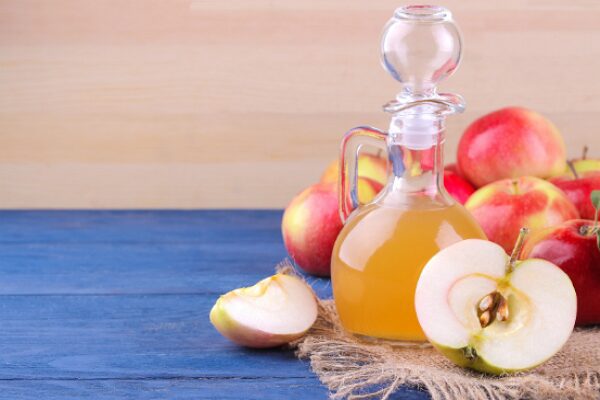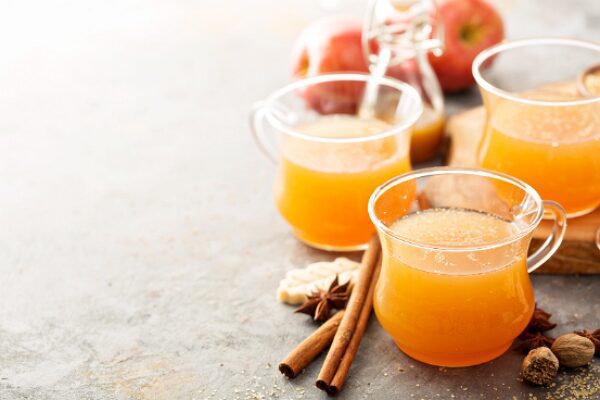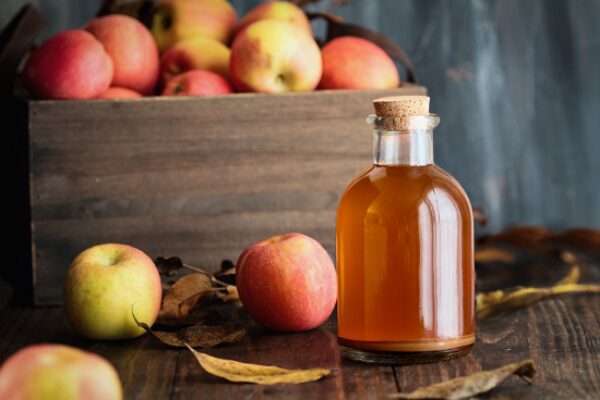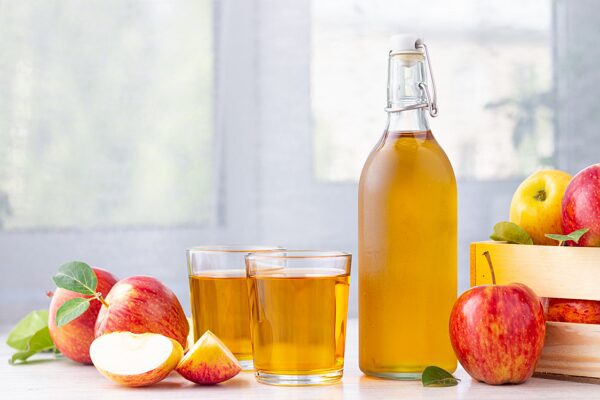
Despite coming from the same fruit, apple cider and apple juice have very different qualities from one another.
Have you ever wondered what differentiates apple juice from apple cider? They are both composed of apples, after all. You’re not the only one who is curious; a fast Google search for apple cider vs apple juice turns up more than a million results.
What distinguishes them from one another, other than the fact that apple juice is typically regarded as a year-round morning beverage and apple cider appears to be most popular in the fall? Let’s explore it.
Related: What To Do With Leftover Apples? (Quick Ideas)
What Is Apple Cider?
Apple cider is a drink made from fresh apples that are crushed and then the juice is fermented. It is often consumed during the fall months and can be enjoyed hot or cold. Apple cider contains polyphenols, which are compounds in plants that act as antioxidants.
These compounds can help the body to fight against free radicals and cell damage, lowering the risk of certain diseases such as heart disease and cancer. Additionally, the polyphenols in apple cider can help influence the good bacteria in the gut and restore the gut flora and improve digestive function due to their probiotics.
Apple cider vinegar has also been studied for its potential health benefits. Some studies suggest that consuming apple cider vinegar after a meal could lower blood glucose levels, which could be helpful for people with Type 2 diabetes or prediabetes.
It is important to note that while apple cider and apple cider vinegar may have potential health benefits, they should be consumed in moderation and as part of a balanced diet. Additionally, more research is needed to fully understand the health benefits of these drinks.
What Is Apple Juice?
Apple juice is created by pressing apples. Several health benefits of drinking apple juice include: Apple juice contains a considerable amount of vitamin C, which is crucial to the body’s immune system. It is also an excellent source of antioxidants. By serving as an antioxidant and defending the body against oxidative stress and inflammation, vitamin C strengthens the immune system.
Apple juice consumption may boost blood antioxidant activity and assist in preventing the oxidation of LDL (bad) cholesterol. This could lower your risk of developing heart disease and it is also good for the skin, it aids in reducing wrinkles, itchiness, and irritation. It also delays the onset of premature skin aging. Natural elements in apple juice can encourage bowel motions and enhance gut health.
Remember that apple juice should only be consumed seldom because it contains a lot of calories and sugar. Only one serving, or a 1/2 cup, of 100% fruit juice is advised as part of your daily fruit intake, according to the Dietary Guidelines for Americans.
Apple Cider vs Apple Juice: 5 Differences

What precisely differentiates these two beverages? Here’s a comparison between apple cider vs apple juice.
Processing
The primary difference between apple cider and apple juice lies in their processing methods. Apple cider is made by pressing fresh apples to extract their juice, which is then typically filtered to remove any solid particles and pasteurized to extend its shelf life. The resulting juice is often cloudy in appearance due to the presence of apple pulp and other solids, and it has a slightly tart, tangy flavor.
In contrast, apple juice is made by pressing apples to extract their juice, which is then typically filtered to remove any solid particles and clarified to remove any cloudiness. The juice is then often pasteurized and bottled for sale. The resulting juice is clear and has a sweeter, more mild taste than apple cider.
Color
Apple cider vs apple juice can have different colors depending on the specific production process used by the manufacturer. Typically, apple cider is a cloudy and darker beverage compared to apple juice, which is usually clear and lighter in color.
It’s worth noting that there can be variations in color between different brands of apple cider and apple juice, and some manufacturers may add artificial colors or other ingredients that can affect the appearance of the final product.
Taste
Apple cider and apple juice are both made from apples, but they have some distinct differences in taste. Apple cider has a rich, tangy flavor that is often described as being slightly sweet and slightly tart. It has a more complex flavor profile than apple juice, with delicate notes of spices like cinnamon and nutmeg.
Apple juice has a lighter, sweeter taste than apple cider. It is often more refreshing and thirst-quenching than apple cider, with a crisp, clean flavor that is more straightforward than apple cider.
Temperature
There are no significant differences in temperature between apple cider vs apple juice. Both are typically served chilled or at room temperature.
However, if either apple cider or apple juice has been heated for consumption, such as for making mulled cider or hot apple juice, then the temperature would be higher. In general, heated apple cider is more commonly associated with warming fall beverages, while apple juice is more often consumed cold or at room temperature.
Shelf Life
Apple cider and apple juice differ in terms of their shelf life because of their processing and preservation methods.
Apple cider is made by crushing and pressing fresh apples. It is an unfiltered and unpasteurized beverage, which means it contains natural sugars and microorganisms. This gives it a relatively short shelf life of about 7-10 days when refrigerated, as the microorganisms in the cider can continue to ferment and cause spoilage.
Contrarily, apple juice is made by filtering and pasteurizing the liquid obtained from crushing and pressing apples. This process removes most of the natural sugars and microorganisms, giving it a longer shelf life of up to several months when stored properly.
Related: What to Do With Leftover Apple Cider? (Quick Ideas)
Apple Cider vs Apple Juice: Which Will You Delight?

It ultimately depends on your personal taste and preferences. If you’re looking for a warm and cozy drink to enjoy during the fall months, apple cider is the way to go. But if you’re looking for a refreshing and sweet drink to quench your thirst, apple juice is the better option.
No matter which one you choose, both apple cider and apple juice are delicious and healthy beverages that offer a variety of health benefits. So go ahead and delight in whichever one speaks to your taste buds!
FAQs
1) Can I substitute apple juice for apple cider?
In some cases, you may be able to substitute apple juice for apple cider, but it depends on the recipe and what you’re trying to achieve. If you’re using apple cider as a key ingredient in a recipe, like for mulled cider or apple cider donuts, it’s best to use apple cider rather than apple juice, as the flavor and texture will be different.
However, if you’re using apple cider as a minor ingredient, you may be able to substitute apple juice without too much of a difference in the final result. Just know that the flavor may be a bit sweeter and less tangy than if you were using apple cider.
2) Is apple cider healthier than apple juice?
According to several sources, apple cider may be considered healthier than apple juice due to its higher content of polyphenols, which are plant compounds that act as antioxidants and can help the body fight against free radicals and cell damage, lowering the risk of certain types of cancer, diabetes, and heart disease.
Polyphenols also help to ease inflammation in the body. However, apple juice may have its advantages as well. For example, both apple cider and apple juice can protect against certain cancers, and they are also known to protect against asthma and brain cell damage. Ultimately, the choice between apple cider and apple juice comes down to personal preference and nutrition goals.
3) Is apple cider alcoholic?
Yes, apple cider can be alcoholic or non-alcoholic, depending on how it is made. According to UpThirst, “Cider is a type of alcoholic beverage that is made from fermented apple juice. Hard ciders are typically made with more sugar than other types of cider, which leads to a higher ABV. Some ciders have an ABV as high as 10% or 12%. However, non-alcoholic apple cider, also known as sweet cider, is an unfiltered, unsweetened, non-alcoholic beverage made from apples.
Which Is Best For You? Apple Cider vs Apple Juice
Both apple cider and apple juice have nutritional benefits, but they are different products with different characteristics.
Apple cider is made by pressing fresh apples and leaving the juice to ferment, resulting in a tangy, slightly alcoholic beverage. It may also be pasteurized to increase its shelf life, but it retains more of the natural flavors and nutrients of the apple than juice. However, some commercial varieties may contain added sugars and preservatives, so it’s important to read the label.
Apple juice is made by extracting the juice from apples and then pasteurizing it to extend its shelf life. While it still contains vitamins and minerals, it may have added sugars and preservatives. Also, it is usually filtered and may lack some of the fiber and phytonutrients that are present in apple cider.
Both apple cider and apple juice can be part of a healthy diet, but in terms of nutrition, apple cider may offer a slightly more robust profile because it has more natural apple flavors and nutrients. However, it’s essential to choose the product carefully and to moderate consumption because of its sugar content and calorie density.

